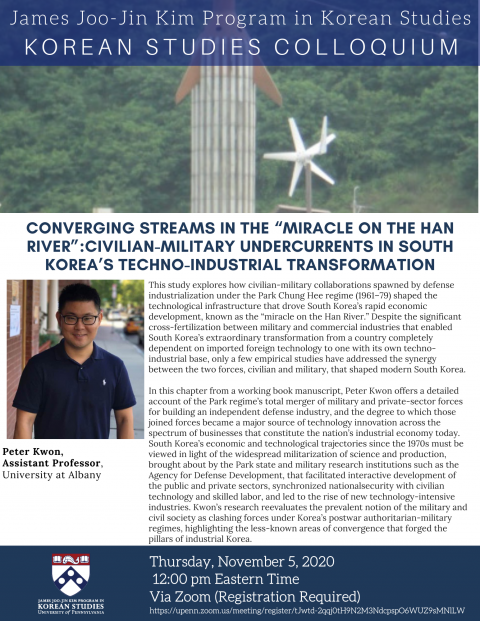
Korean Studies Colloquium
Via Zoom
*Registration required: please register via the following link: https://upenn.zoom.us/meeting/register/tJwtd-2qqj0tH9N2M3NdcpspO6WUZ9sMNlLW
This study explores how civilian-military collaborations spawned by defense industrialization under the Park Chung Hee regime (1961–79) shaped the technological infrastructure that drove South Korea’s rapid economic development, known as the “miracle on the Han River.” Despite the significant cross-fertilization between military and commercial industries that enabled South Korea’s extraordinary transformation from a country completely dependent on imported foreign technology to one with its own techno-industrial base, only a few empirical studies have addressed the synergy between the two forces, civilian and military, that shaped modern South Korea.
In this chapter from a working book manuscript, Peter Kwon offers a detailed account of the Park regime’s total merger of military and private-sector forces for building an independent defense industry, and the degree to which those joined forces became a major source of technology innovation across the spectrum of businesses that constitute the nation’s industrial economy today. South Korea’s economic and technological trajectories since the 1970s must be viewed in light of the widespread militarization of science and production, brought about by the Park state and military research institutions such as the Agency for Defense Development, that facilitated interactive development of the public and private sectors, synchronized nationalsecurity with civilian technology and skilled labor, and led to the rise of new technology-intensive industries. Kwon’s research reevaluates the prevalent notion of the military and civil society as clashing forces under Korea’s postwar authoritarian-military regimes, highlighting the less-known areas of convergence that forged the pillars of industrial Korea.
 James Joo-Jin Kim Center for Korean Studies
James Joo-Jin Kim Center for Korean Studies